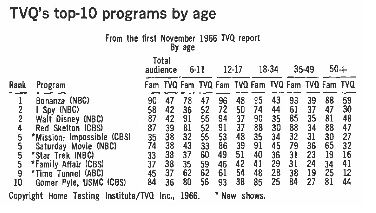I wonder how much different these books are to others of this type? Star Trek is under such scrutiny by fans and scholars alike that every new piece of evidence at this point is heavily gone over and discussed. But what if these books were about Bonanza or The Dick Van Dyke Show? Would they be universally accepted as fact? Or would we have fans going through the archives to confirm because something doesn’t seem right? Are those other books as rife with errors that people just accept? Trek fandom is a lot more exacting the thorough, I think. A book on The Time Tunnel came out, using many of the same research tools. Fans of that series just loved it. An interesting comparison, if nothing else.
The Dick Vany Dyke Show and
Bonanza simply don't have the passionate fan followings that
Star Trek does (few shows do). If a comparable book to Cushman's
These Are The Voyages came out, I doubt the interest would be there to sell nearly as many self-published books (or to raise nearly $12,000 prior to publication on Kickstarter, something Cushman did for this series, which makes you wonder where all the money went).
I don't doubt there are other television histories out there with comparable low levels of scholarship. A PhD candidate I know once wrote a paper about
The Monkees, and in the process of researching it, she discovered that every book about the series was absolute rubbish -- filled with total falsehoods, broad generalizations, etc. And these weren't self-published books she was looking at!
Of course, this problem isn't exclusive to television histories written by fans/amateurs. Television studies is still an emerging academic field, and there's a lot of sloppiness out there that wouldn't occur if you were, let's say, an Alfred Hitchcock scholar. Enough academics have tread over that ground that they know bullshit when they see it. But television scholars are still trying to get broad recognition from their peers, not unlike film scholars forty years ago, when the field was similarly sloppy. This sort of thing will work itself out, over time, but it takes a while.





